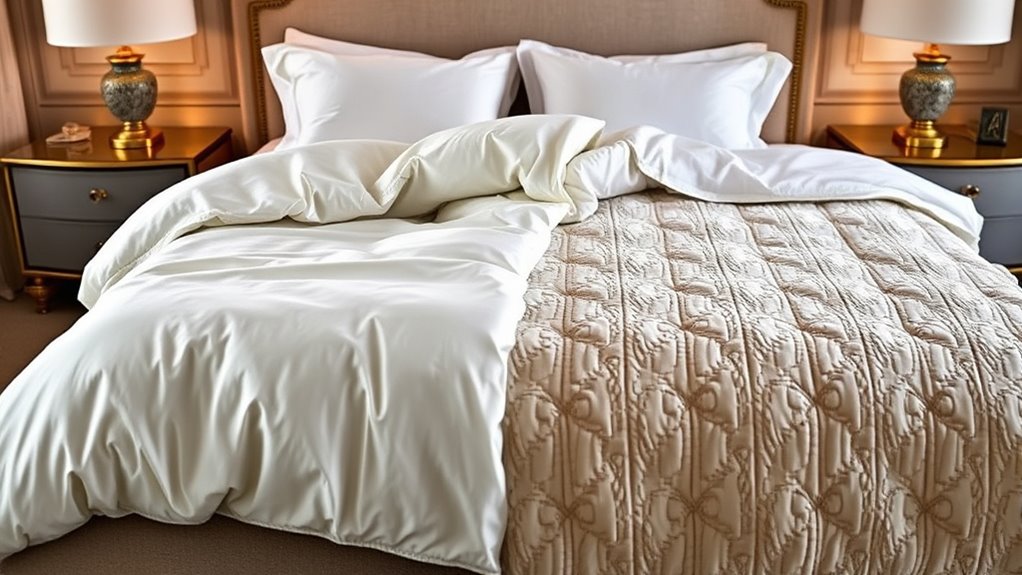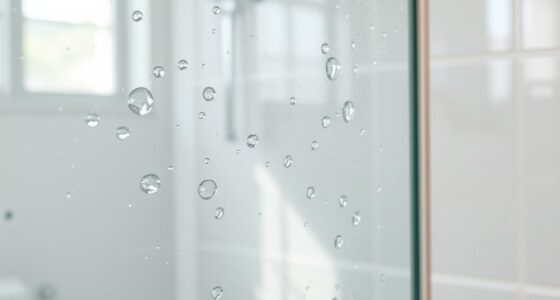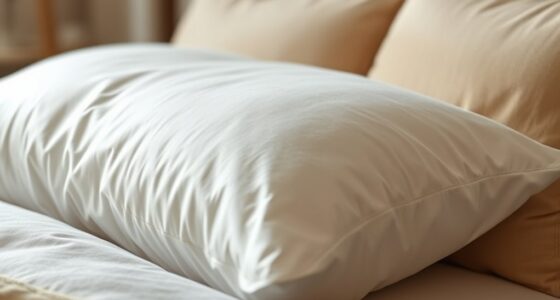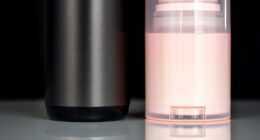Choosing between a duvet and a comforter depends on your lifestyle, decorating style, and maintenance preferences. If you enjoy customizing your bedding look and don’t mind changing covers, a duvet offers flexibility. However, if you prefer convenience and minimal fuss, a comforter is easier to use and wash. Your sleep habits and how often you want to clean your bedding play a big role too. To find the best fit for your sleep style, explore the details further.
Key Takeaways
- Choose a duvet if you enjoy customizing your bedding with different covers and don’t mind occasional maintenance.
- Opt for a comforter if you prefer a ready-to-use, low-maintenance bedding option with minimal fuss.
- Duvets are ideal for those who like seasonal updates and versatile decor styles.
- Comforters suit individuals who wash bedding frequently and want an all-in-one, easy-to-clean solution.
- Consider your lifestyle and cleaning routines to select the option that best matches your sleep and maintenance preferences.

When choosing bedding, many people wonder whether a duvet or comforter is the better option for their needs. The decision often comes down to your preferred sleep style, maintenance habits, and aesthetic preferences. Duvets and comforters serve the same purpose—keeping you warm—but they differ markedly in design, usage, and care. Understanding these differences helps you select the bedding that suits your lifestyle best.
Choosing between a duvet and comforter depends on your sleep style, maintenance habits, and aesthetic preferences.
A duvet is fundamentally a soft, filled insert that you place inside a duvet cover. Think of it as a giant pillow with filling—usually down, feathers, wool, or synthetic materials—that provides warmth. You can swap out duvet covers easily, which makes changing your room’s look simple and inexpensive. This flexibility appeals to those who enjoy regularly updating their decor or prefer a minimalist approach. Duvets are often thicker and fluffier, giving a luxurious, plush feel. They’re especially great if you like to customize your bedding or prefer a lightweight, breathable layer of insulation. However, because the duvet itself is usually not removable, cleaning it typically involves washing the entire piece or having it professionally cleaned, which can be more time-consuming and costly. Additionally, duvet inserts can be more difficult to store when not in use, requiring extra space.
Comforters, on the other hand, are all-in-one bedding pieces that come pre-filled and sewn shut. They typically feature decorative fabrics on the outside, making them ready to use straight out of the package. Comforters are designed to be more convenient—no need to buy separate covers or worry about fitting a duvet. They’re available in a variety of styles, colors, and patterns, so you can easily match your room decor without extra effort. Comforters are also generally easier to clean because you can simply toss them in the washing machine. If you prefer low-maintenance bedding that requires minimal fuss, comforters might be the right choice. However, they are often less versatile than duvets since changing their appearance usually means replacing the entire comforter rather than swapping covers.
Your sleep style influences which option works best for you. If you like the idea of customizing your bedding and don’t mind occasional maintenance, a duvet could be ideal. If you value simplicity and convenience, a comforter might suit you better. Consider how often you want to wash your bedding, your aesthetic preferences, and whether you enjoy decorating or prefer straightforward functionality. Both options have their strengths, but choosing what aligns with your habits and style will ensure you get a good night’s sleep, surrounded by bedding that feels just right. Recognizing the differences in maintenance requirements can help you make a more informed decision tailored to your lifestyle.
Frequently Asked Questions
Which Bedding Is Better for Allergy Sufferers?
You should choose a hypoallergenic comforter or duvet insert, as they’re designed to reduce allergens. Look for those labeled as allergy-friendly, made from synthetic fibers, or with tightly woven covers that block dust mites and mold. Regularly washing your bedding also helps. By selecting the right materials and maintaining cleanliness, you create a healthier sleep environment and minimize allergy symptoms, ensuring better rest each night.
How Often Should I Replace My Duvet or Comforter?
Replacing your duvet or comforter is like changing the batteries in a flashlight—you should do it every 1 to 2 years. This keeps allergens, dust mites, and bacteria at bay, ensuring a healthier sleep environment. If you notice persistent odors, stains, or loss of fluffiness, it’s time for a swap. Regular washing helps extend their life, but replacement every couple of years keeps your bedding fresh and comfortable.
Can Duvets and Comforters Be Used Together?
Yes, you can use duvets and comforters together for added warmth and style. Layering them allows you to adjust your bedding based on the season or your comfort preferences. Just make sure the duvet fits inside the comforter or use a duvet cover to keep things neat. This combo can create a cozy, versatile sleeping environment, giving you options to customize your sleep experience easily.
Are There Eco-Friendly Options for Duvets and Comforters?
Yes, there are eco-friendly options for duvets and comforters. You can choose ones made from organic cotton, hemp, or bamboo, which are sustainable and biodegradable. Look for certifications like GOTS or OEKO-TEX to guarantee eco-standards. Additionally, opt for fillings like natural wool, recycled fibers, or organic down. These choices help reduce environmental impact while keeping you cozy and comfortable.
What Are the Best Materials for Hot Sleepers?
If you’re a hot sleeper, look for bedding made from breathable materials like cotton, linen, or bamboo. These fabrics promote airflow and wick away moisture, helping you stay cool throughout the night. Avoid heavy, non-breathable fabrics like polyester or wool, which can trap heat. Opt for lightweight, natural fibers, and consider cooling inserts or breathable covers to enhance your comfort and prevent overheating.
Conclusion
Choosing between a duvet and a comforter depends on your sleep style, but did you know that 65% of Americans prefer a duvet for its versatility? Whether you like tossing and turning or staying cozy, understanding the differences helps you pick the perfect bedding. Remember, comfort is key to a good night’s sleep. So, consider your preferences and this interesting stat to make the best choice for your restful nights ahead.









